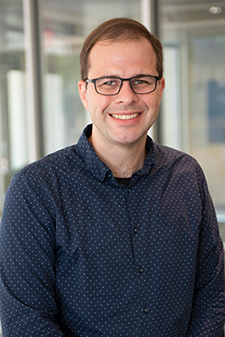Research Interests
Our group works on developing new theoretical tools for accelerating computational materials design, simulating and analyzing the spectroscopy of condensed phase and interfacial systems, and characterizing the structure and dynamics of disordered biophysical systems. In each main area of the group, we have both pure methods development projects and applied projects that often involve collaborations with other experimental or computational groups.
Some of our current research activities include:
- Integrating reinforcement learning methods with high-performance quantum chemistry for the inverse design of new organic functional materials, including singlet-fission materials and organic radical polymer batteries
- Building new representations for intrinsically disordered proteins
- Characterizing the smallest building blocks of secondary organic aerosol seed particles
- Developing scientific machine learning methods that can calculate the vibrational and electronic spectroscopy of complicated materials with limited information
- Designing new representations that enable the low-cost prediction of chemical reaction outcomes in extreme environments
Educational Background
- Postdoctoral Fellow, Harvard University, 2016-2019
- Ph.D. Chemistry, University of Wisconsin—Madison, 2016
- B.S. Chemistry, University of Texas at Austin, 2011
Awards & Honors
- ACS Comp Division OpenEye Cadence Molecular Sciences Outstanding Junior Faculty Award in Computational Chemistry, 2024
- Finalist, ACS Energy Letters Lectureship Award, 2024
- Montague-Center for Teaching Excellence Scholar, 2023
- NSF CAREER Award, 2023
- Cottrell Scholar, Research Corporation for Science Advancement, 2023
- Texas A&M Institute of Data Science Career Initiation Fellow, 2021
- Richard and Joan Hartl Excellence in Research Award for Physical Chemistry, University of Wisconsin–Madison, 2016.
- Poster Award, Physical Division, ACS National Meeting, Fall 2015.
- Beckman Scholar, 2010-2011
Selected Publications
- R. Alessandri, C.-H. Li, S. Keating, K.T. Mohanty, A. Peng, J.L. Lutkenhaus, S. J. Rowan, D.P. Tabor,* and J.J. de Pablo,* Structural, Ionic, and Electronic Properties of Solid-State Phthalimide-Containing Polymers for All-Organic Batteries, JACS Au 4, 2300–2311 (2024).
- C.-H. Li and D.P. Tabor,* Generative Organic Electronic Molecular Design Informed by Quantum Chemistry, Chem. Sci. 14, 11045 (2023).
- T.-H. Chao, S. Rekhi, J. Mittal, and D.P. Tabor,* Data-Driven Models for Predicting Intrinsically Disordered Protein Polymer Physics Directly from Composition or Sequence, Mol. Syst. Des. Eng. 8, 1146-1155 (2023).
- T. Ma, C.-H. Li, R.M. Thakur, D.P. Tabor, and J.L. Lutkenhaus,* The role of the electrolyte in non-conjugated radical polymers for metal-free aqueous energy storage electrodes, Nat. Mater. 22, 495-502 (2023).
- C.-H. Li and D.P. Tabor,* Reorganization Energy Predictions with Graph Neural Networks Informed by Low-Cost Conformers, J. Phys. Chem. A 127, 3484–3489 (2023).
- C.-H. Li and D.P. Tabor,* Discovery of lead low-potential radical candidates for organic radical polymer batteries with machine-learning-assisted virtual screening, J. Mater. Chem. A 10, 8273-8282 (2022).

